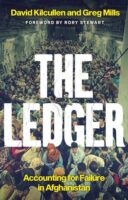Taking Stock of America’s Two Decades in Afghanistan
 Guest Post by Marc Martorell Junyent.
Guest Post by Marc Martorell Junyent.
The border between current events and history is a blurry one. David Kilcullen and Greg Mills tread on both sides of this imaginary boundary in The Ledger: Accounting for Failure in Afghanistan. The co-authors have a long experience in Afghanistan working for the international military coalition in the country.
Throughout the book, they manifest their frustration for the chaotic evacuation of US citizens and Afghans that unfolded in August 2021. In their own words, “it would not have taken a rocket scientist to devise a better, more orderly, system.”
Their criticism extends to a much longer time period, however. According to the authors, the West never had a clear strategy in Afghanistan. By focusing on short-term goals, the troops and economic aid deployed to the country did not help build solid structures, but only delayed the collapse of a system based on clientelism, corruption, and the inclusion of former warlords.
Kilcullen and Mills argue that not inviting the Taliban to sit at the negotiation table in the 2001 Bonn Conference, convened right after their overthrow from power, was a key missed opportunity. The US ended up negotiating with the Taliban in the 2020 Doha Agreement from a much weaker position.
The Ledger is particularly strong in the anecdotical evidence it presents, based on the authors’ wide range of contacts among Afghan elites and Western officials. On the contrary, the reader would probably have welcomed a more consistent book structure. The continuous chronological and thematical shifts are often confusing and lead to redundancies.
When it comes to the immediate future of Afghanistan, Kilcullen and Mills defend the idea that the restoration of aid flows to the country is needed for both humanitarian reasons and maintaining a certain influence with the Taliban.
The Ledger: Accounting for Failure in Afghanistan by David Kilcullen and Greg Mills. Hurst, January 2022.
Reviewer bio: Marc Martorell Junyent graduated in International Relations and currently studies a joint Master in Comparative Middle East Politics and Society at the Eberhard Karls University of Tübingen and the American University in Cairo. His main interests are the politics and history of the Middle East (particularly Iran, Turkey and Yemen). He has studied and worked in Ankara, Istanbul and Tunis. He tweets at @MarcMartorell3.




